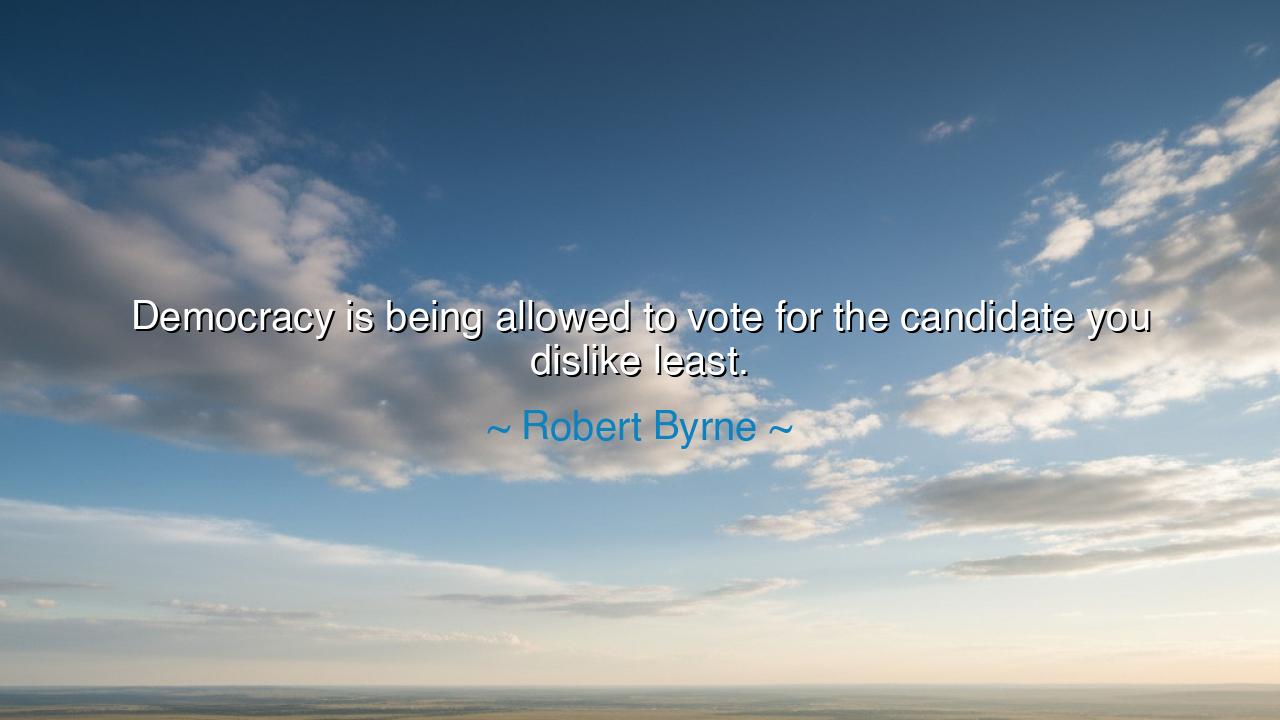
Democracy is being allowed to vote for the candidate you dislike






The words of Robert Byrne — “Democracy is being allowed to vote for the candidate you dislike least.” — fall with the sharp edge of satire, yet they pierce to the heart of a troubling truth. In these few words, Byrne unmasks the disillusionment many feel toward democracy, when it becomes not a joyous expression of freedom but a weary choice between imperfect options. His jest is the sigh of a people who long for greatness, but often find only compromise.
The meaning is both bitter and revealing. Democracy, in its purest vision, is the rule of the people, the chance for every voice to be heard and for leaders to rise who embody the people’s hopes. Yet in practice, it often becomes a system of limitation: candidates chosen by parties, narrowed by power, filtered through wealth and influence. The citizen, instead of choosing a shining champion, may find themselves merely deciding which potential ruler they can endure, and which they cannot. Thus, the act of voting becomes less about hope than about survival.
History gives us many echoes of this truth. Consider the election of 1824 in the United States, when four candidates split the vote and the outcome was decided not by the people but by the House of Representatives. Andrew Jackson won the most votes, yet John Quincy Adams took the presidency through what became known as the “Corrupt Bargain.” For many citizens, their vote felt less like the expression of a dream and more like the settling of an unhappy compromise. Byrne’s jest finds root in such moments, where democracy seems both real and yet unsatisfying.
Yet his words also contain a hidden wisdom. For even when the choice is narrowed to the “least disliked,” the act of choosing remains sacred. The ability to weigh, to reject, to prevent the worst from rising unchecked — this too is the lifeblood of democracy. A flawed choice is still a choice, and in it lies power denied to those who live under tyranny, where no candidate, whether liked or disliked, can be chosen at all.
Let this truth be carried forward: democracy is not the promise of perfect leaders, but the chance for imperfect people to guide their destiny. Byrne’s jest warns us not to grow complacent, but to strive for better, to demand leaders worthy of admiration rather than mere tolerance. And until that day, his words remind us of both the frailty and the strength of freedom — that even the power to vote for the lesser evil is greater than the silence forced by chains.






TONguyen Thi Oanh
Byrne’s quote highlights a common sentiment: that democracy often feels like choosing between the 'least bad' option. But does this stem from the lack of strong, truly inspiring candidates, or is it a deeper flaw in the political system itself? How do we shift from a culture of strategic voting to one where people feel genuinely represented by the candidates they vote for?
NTUng Nho Tu
This quote speaks to the disillusionment many voters face. If democracy is just about picking the lesser of two evils, does that weaken the integrity of the voting process? What if we redefined democracy as a system where citizens could vote for candidates who inspire them, rather than just settling for the least disliked option? How would that change the way we engage with politics and election campaigns?
Aanh
Byrne’s statement might hit a nerve for those who see democracy as more than just a process of elimination. Does it imply that democracy has become a game of choosing the lesser evil, where we no longer vote for what we truly believe in, but rather what seems like the 'least harmful'? How do we foster a political system where people feel that voting can truly reflect their values and aspirations?
Mminhchanh91
This quote really resonates with the frustration many people feel when voting, especially when there are candidates who don’t seem to fully align with our beliefs. Is this the fault of the system itself or more of a reflection of the limitations of candidates? What happens when the political system only offers candidates who seem to be chosen based on 'strategic positioning' rather than actual values and competence?
MDDạng Minh Dúc
Byrne's quote is a cynical but accurate reflection of how many people feel about modern democracy. Is it really democracy if we're only choosing the 'least bad' candidate instead of someone who genuinely represents our values? Does this create a political environment where we feel stuck between two unappealing choices, rather than inspired by the options available to us? How can we move beyond this feeling of disenchantment with the political system?